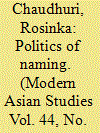|
|
|
Sort Order |
|
|
|
Items / Page
|
|
|
|
|
|
|
| Srl | Item |
| 1 |
ID:
096275


|
|
|
|
|
| Publication |
2010.
|
| Summary/Abstract |
Henry Derozio, India's first modern poet, used the pseudonym 'An East Indian' for several poems he published in his lifetime, and he may have used it again in a heated controversy that played itself out in the correspondence columns of the India Gazette, Calcutta's leading newspaper, from May 26 to June 5, 1825. The occasion was an editorial comment upon a community of office-goers in the city-called, at the time, 'sircars'-who had set up a literary association. This editorial was widely perceived to be reactionary, and civil society responded vigorously in protest at the injustice. The sequence of editorials and letters published on this issue, which seem to have been written by Englishmen, East Indians and Indians alike, demonstrate a remarkable liberalism of spirit and a free-thinking attitude to ethnicity that was soon to disappear in the stiffening boundaries of a racially divided society. 1825 was also the year that Derozio began to publish prolifically in the poetry columns of newspapers and periodicals in the city; by the time he died, in 1831, he had published two books of poems in 1827 and 1828 and had created a revolution of sorts among the radicalised youth of the Hindu College, from which he had been dismissed for his role in their alienation from tradition. In 1831, a few months before his death, Derozio addressed a mammoth meeting called to commemorate the return of John Ricketts, the East Indian representative, from his mission to the English houses of Parliament for a redressal of the community's grievances. Using these two lost occasions-the public correspondence and the meeting-both concerned with the politics of naming, this paper will attempt to present the early radical interventions of the mixed-race community in initiating a discourse of civic rights and human dignity which led, ultimately, to organised attempts at constitutional change and political reform in India, whose estimation is underrated in present-day contexts.
|
|
|
|
|
|
|
|
|
|
|
|
|
|
|
|
|
|
|
|
|